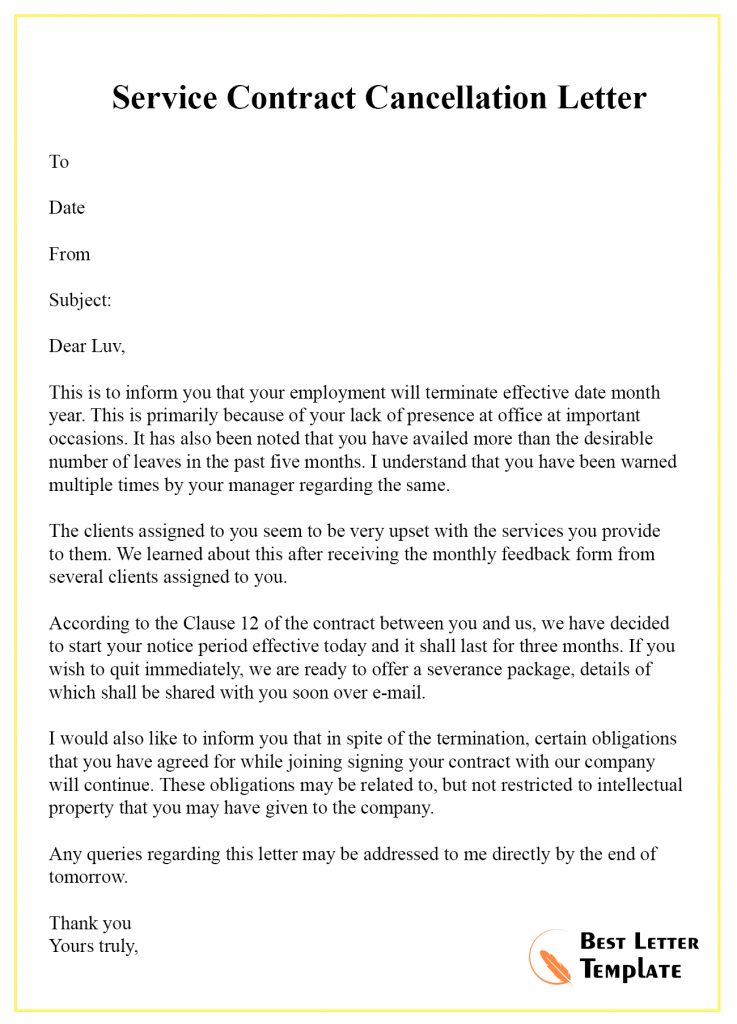Understanding the 30-Day Cancellation Clause

Have you ever felt trapped in a contract, wishing you had a way out? A 30-day cancellation clause can be your escape hatch. This seemingly simple provision can have a profound impact on your contractual agreements, offering both protection and flexibility. Understanding its nuances can empower you to navigate agreements with confidence.
A 30-day cancellation clause, also known as a 30-day termination clause, allows either party involved in a contract to terminate the agreement with a written notice provided at least 30 days before the intended termination date. This notice period gives both parties time to adjust to the change and make alternative arrangements. The clause is designed to prevent sudden and disruptive terminations while providing a reasonable timeframe for winding down the agreement.
The history of such clauses likely stems from the need for fairness and predictability in contractual relationships. As commerce and contracts became more complex, the need for a structured exit strategy became apparent. These clauses help avoid unnecessary legal battles and foster a sense of trust between contracting parties.
The importance of a 30-day cancellation notice cannot be overstated. It provides a safety net, allowing you to reconsider your commitment without facing significant penalties. Imagine signing a long-term service contract only to discover later that the service doesn't meet your needs. A 30-day cancellation clause offers a way out, minimizing your financial exposure and allowing you to explore alternative options.
One of the main issues related to these clauses is the specificity of the language used. Ambiguity in the wording can lead to disputes. For example, if the clause doesn't clearly state the method of delivering the notice, it could create confusion and potentially invalidate the cancellation attempt. Clarity and precision are crucial for ensuring the enforceability of the clause.
A simple example of a 30-day cancellation clause in a gym membership contract might read: "This agreement may be terminated by either party with 30 days’ written notice delivered to the other party."
One benefit is the flexibility it provides. If your circumstances change, you're not locked into a long-term commitment. Another benefit is the protection it offers. It safeguards you from unexpected changes in service quality or unforeseen circumstances. Finally, having a cancellation clause can empower you to negotiate better terms, as it signals your willingness to walk away from a deal that doesn't meet your needs.
To effectively use a cancellation clause, review the contract thoroughly. Understand the exact wording and requirements of the clause. Provide written notice as required, keeping a copy for your records. Confirm receipt of the notice by the other party.
Advantages and Disadvantages of 30-Day Cancellation Clauses
| Advantages | Disadvantages |
|---|---|
| Flexibility and Control | Potential for Disruption |
| Protection from Unforeseen Circumstances | Negotiating Complexity |
Best practices for implementing a 30-day cancellation clause include: using clear and concise language, specifying the method of delivery, stating the effective date of cancellation, including provisions for refunds or penalties, and consulting with legal counsel to ensure enforceability.
Examples of 30-day cancellation clauses can be found in gym memberships, software subscriptions, rental agreements, and various service contracts. The details will vary based on the specific industry and agreement.
Challenges related to these clauses include disputes over the validity of the notice, disagreements on the effective date of cancellation, and issues with refunds. Solutions involve clear communication, mediation, and in some cases, legal action.
FAQs about 30-day cancellation clauses cover topics like what constitutes valid notice, the consequences of failing to provide proper notice, the impact on pre-paid fees, and the options for resolving disputes.
Tips and tricks include documenting all communication related to the cancellation process, and seeking legal advice if any ambiguities or disputes arise.
In conclusion, the 30-day cancellation clause is a vital element of many contracts. It empowers individuals and businesses with the flexibility and protection they need to navigate agreements confidently. While the clause itself is seemingly simple, understanding its nuances and implementing it effectively is crucial for maximizing its benefits. By being informed and proactive, you can use this clause to protect your interests and ensure a fair and predictable outcome in your contractual relationships. Taking advantage of the 30-day cancellation clause is not about being opportunistic; it’s about ensuring a level playing field and enabling you to make informed decisions without the fear of being locked into an unfavorable situation. It’s about peace of mind and control in your contractual commitments.
Navigating the complexities of indirect communication in infidelity
Decoding dog leg growths pictures online
Choosing the right rest in peace background image













